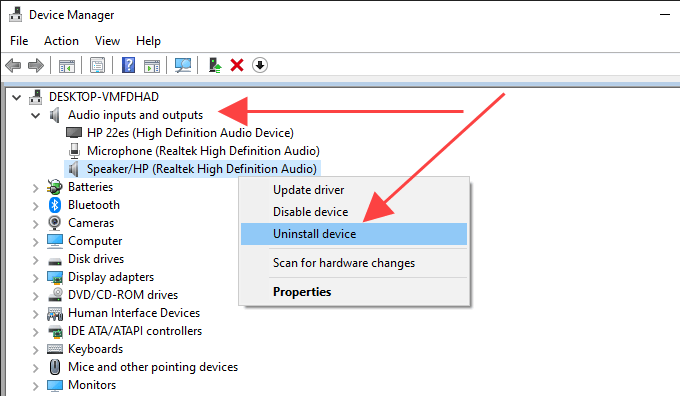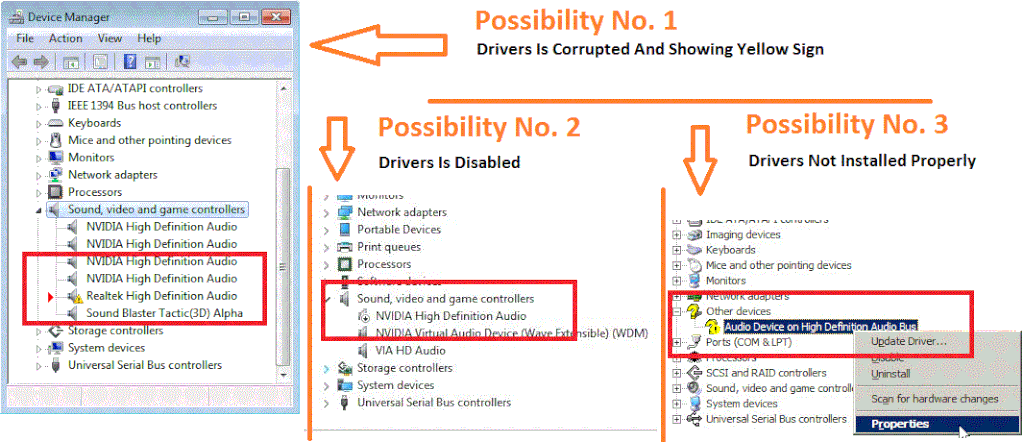
- #Pc showing no audio output device installed install#
- #Pc showing no audio output device installed drivers#
- #Pc showing no audio output device installed update#
_ Windows MVP 2010-20 Millions helped via my tutorials and personally in forums for 12 years.
#Pc showing no audio output device installed install#
Thoroughly research any product advertised on the sites before you decide to download and install it. Watch out for ads on the sites that may advertise products frequently classified as a PUP (Potentially Unwanted Products). The pages appear to be providing accurate, safe information. Standard Disclaimer: There are links to non-Microsoft websites. I will keep working with you until it's resolved. Feel free to ask back any questions and let us know how it goes. This solves many problems and will also bring it up to the latest version which you need anyway and by the most stable method. Then continue with the other steps to go over your install most thoroughly.ġ3) If nothing else helps then run a Repair Install by installing the Media Creation Tool and choosing from it to Upgrade Now. Start with Step 4 to turn off Startup freeloaders which can conflict and cause issues, then Step 7 to check for infection the most thorough way, then step 10 to check for damaged System Files.

ġ2) Go over this checklist to make sure the install is set up correctly, optimized for best performance, and any needed repairs get done.
#Pc showing no audio output device installed update#
ġ1) You can also use System Restore to get before the problem began, then check for Updates with the Hide Update tool and hide them. ġ0) If this was caused by Version 1809 update (which you can confirm at Settings > System > About) then you can roll back Version 1809 in Settings>Update & Security>Recovery and then hide it until it matures using the Hide Updates Tool downloaded from here.
#Pc showing no audio output device installed drivers#
To try all previous drivers installed on your system, in Device Manager choose Sound controller's Driver tab, then Update Driver, then Browse, then Let Me Pick.ĩ) If this was caused by Windows Updates then you can check which were installed at Settings>Update & Security>Windows Update under Installed Updates, then uninstall them from the link there, and hide with the Hide Updates tool downloaded from here.

For example, try the next oldest driver in the model's online Support Downloads list. Restart PC to reinstall.Ĩ) Try other and older drivers for your model Sound controller, too. Choose Sound controller and other audio devices, then Driver tab, then Roll back if available.ħ) If no newer sound drivers then uninstall the one presently installed in Device Manager, reached by right clicking the Start Button. If not use the Troubleshoot button nearby.ĥ) Run the Playing Sound troubleshooter at Start button > Settings>Update & Security>Troubleshoot.Ħ) Try rolling back the sound drivers in Device Manager reached by right clicking the Start button. While there compare to make sure you also have the latest BIOS, Chipset, Display, Network and all other drivers.Ĥ) Right click Volume icon in System Tray, choose Sound Settings, from the Output and Input devices dropdown menus, choose then one(s) affected to see if that helps. ģ) Update the sound driver from the PC maker's Support Downloads webpage for your exact model, if it is newer than the one presently installed in Device Manager reached by right clicking the Start button. Ģ) Restore the Windows Audio Service which may have become disabled. All other steps here:ġ) For sound problems first try this checklist. If it's a laptop then it may have modified the sound controller driver so it and all other drivers need to come first from the maker's Support Downloads web page. I'm Greg, an installation specialist, 9 year Windows MVP and Independent Advisor, here to help you.


 0 kommentar(er)
0 kommentar(er)
